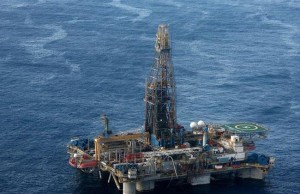The Cyprus solution
How European-Mediterranean energy collaboration can solve problems all around
More and more people are arriving at the same conclusion: a miracle cure for much of what ails the European Union is close at hand, and Cyprus is easily the best place to dispense it.
Apart from Germany and a few other exceptions, the EU economy is in a historic slump, while its appetite for energy makes it unnervingly dependent on Russia, which supplies a third of Europe’s gas imports, and other suppliers outside its borders — thereby making the union dangerously vulnerable to factors beyond its control. The recent confrontation over Ukraine only underscored the potential precariousness of this arrangement: while Russia is not likely to damage its own interests by turning off the taps that supply its biggest customer, its pipelines cross the borders of multiple countries that might perceive an interest in disrupting the flow.
Luckily, however, all recent exploration work indicates that deposits beneath the Eastern Mediterranean seabed contain sufficient amounts of oil and (especially) natural gas to revitalize Europe’s economy for decades to come.
Cyprus, Israel, Lebanon and Palestine share what has emerged as a collection of world-class formations; Israel is the only country that has already begun to exploit its reserves, but Cyprus should follow in a few short years. Palestine’s potential can’t be unlocked until some kind of deal is reached with Israel, and Lebanon has been delayed by domestic political infighting, but the latter’s reserves now appear to be the most extensive of the four. And in the longer term, new studies show that Greece may be the real kingpin of the Eastern Mediterranean, further enlarging the region’s capacity to fuel a European renaissance with cheap, safe and reliable energy supplies.
It is difficult to overstate the potential of this treasure trove. Going by the latest estimates, Cyprus will shortly be in position to provide clean, safe and reliable supplies that will meet 20 percent of Europe’s gas needs. Throw in Lebanon and Israel, and that figure rises to 30 percent, while Greece could bring it to 40 percent by 2020. By increasing the number of competing producers, development of the Eastern Mediterranean will also lead to lower energy prices, driving growth across the EU.
For the producers, it means a new shared stake in peace and stability, massive revenues to fund socioeconomic development and permanent reductions in poverty and other needs. For the consumers, it means an economic revival on the scale of America’s ‘fracking revolution’ — with far less controversy and environmental risk.
For the EU as a whole, it can mean even more: restoring both the momentum of the European project and public faith therein, and reducing tensions among member states, particularly along the traditional North–South axis, caused by economic hardship. It can also transform Europe’s southeastern flank, turning a source of instability and refugees into one of opportunity and partnership. Nothing would more fully accomplish the goals of the Euro–Mediterranean ideal, as refined over the years at Trieste, Barcelona and other venues.
Passing the pipe
These and other gains will not be achieved without first surmounting a few obstacles. The primary political hurdles include Israel’s dismal relations with its Arab neighbors, which make direct cooperation virtually impossible for the time being. Meanwhile, the main technical challenges center on getting the gas to thirsty markets on the European mainland, as well as other customers in East Africa and South Asia.
Cyprus can solve all of these problems — and more — by avoiding, simplifying or essentially erasing them. Its diplomatic position already gives it friendly ties with countries on both sides of the Arab–Israeli divide, and its geographical location makes it the only logical place to situate a new regional energy hub. If the necessary investments are forthcoming, that hub will gather the gas produced by all Eastern Mediterranean countries for distribution via pipeline, ideally via Greece’s Ionian Sea. Why the Ionian? Because that’s where Greece’s potential deposits are situated, so running the pipe through there means turn-key access when those reserves are ready to enter the European energy mix.
In the past I’ve referred to this link as the ‘Peace Pipe,’ mainly because it would almost force the Arabs and the Israelis to regard one another as indirect business partners rather than as mortal enemies. From the EU’s perspective, we could also call it the ‘Prosperity Pipe,’ since it would substantially decrease production and other costs, restoring much of Europe’s competitiveness and opening the way for the revival of its economy.
Other potential markets are far removed from pipeline routes, so the hub should also include a liquefied natural gas (LNG) plant, the output of which would be carried by ship to power stations and other customers along the African and Asian littorals, places where energy is badly needed to achieve development goals. Dubbing this the ‘Peace Plant’ sounds about right, but it’s what the facility will achieve, not what anyone will call it, that will be important. Opening access to more customers will further expand the shared stake of Arabs and Israelis, lessening the likelihood of future conflict.
Once again, the placement of these prospective LNG markets docks perfectly with Cyprus’ geographical and diplomatic qualities, further reinforcing its status as the most commercially viable site to serve as host for the region’s emerging energy economy.
But there’s more — much more. As an EU member state, Cyprus is party to its stringent environmental and competition laws, rules by which other current and potential suppliers (notably Russia and even more distant producers in Central Asia) are not bound. This means no more worries about transit rights, after-the-fact price disputes or violations of sulphur standards: gas processed, piped or shipped through the island would be bound to comply with EU standards on these and other issues.
Europe’s choice
Rarely has any undertaking, let alone one with such far-reaching ramifications, been more eminently qualified to receive official EU recognition as a Project of Common Interest, or key energy infrastructure. The EU’s uppermost governing body, the European Commission, is the rightful catalyst to bring all of these considerations together, not only by providing its own funds, but also by recruiting and coordinating other sources of financing, including the World Bank, major international oil companies (IOCs) and other public, private and multilateral actors.
There is reason for optimism. The European Commission of late has demonstrated increasing interest in the potential of the Eastern Mediterranean in general and Cyprus in particular — and greater awareness of the urgency involved. Vice President and Energy Commissioner Günther Oettinger made all the right signals at an energy conference in Malta, and his voice will be heard, not just because he hails from Germany and is therefore seen as representing the ‘North European’ perspective, but also because his personal reputation is for sober analysis rather than over-enthusiastic boosterism.
In fact, Cyprus will almost certainly become some sort of gas hub regardless of European stewardship: Halliburton and Schlumberger, the world’s biggest oil and gas services providers, have already selected the island as their respective regional headquarters, which tells us all we need to know about what industry insiders think.
The difference is that if the private sector takes the lead, the hub will be designed, developed and oriented to serve the interests of the IOCs; benefits will certainly accrue to Cyprus and the rest of the EU, but mostly as side effects. By contrast, if Brussels plays its rightful role, the entire process will be shaped in such a way as to maximize its advantages for EU citizens. More than ever, the choice is clear.




